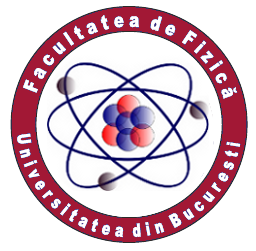|
UNIVERSITATEA DIN BUCUREŞTI
FACULTATEA DE FIZICĂ
Atomic and Nuclear Physics, Elementary Particles, Astrophysics and Applications
In the direction of doctoral studies Atomic and Nuclear Physics, Elementary Particles, Astrophysics and Applications you have the opportunity to become familiarized to concepts specific to these disciplines and to be involved in a state-of-the-art research activity in the Faculty of Physics, the institutes on the Măgurele platform, especially the Horia Hulubei National Institute for Research and Development in Physics and Nuclear Engineering, or in international scientific collaborations such as CERN/ALICE or Pierre Auger.
You will be guided to perform scientific research in a wide range of areas, such as:
- ion-atom interaction processes and applications, spectrometric and atomic and nuclear techniques for material characterization, determination of polluting elements in the environment (prof.dr. Ion V. POPESCU);
- hydrodynamic behavior of nuclear matter, strangeness increase in relativistic and ultrarelativistic nuclear collisions, cumulativity and nuclear matter jets in nucleus-nucleus collisions, correlations and anti-correlations in particle generation, phase diagrams of nuclear matter, study of the interaction of cosmic radiations with underground detectors (prof.dr. Alexandru JIPA);
- nuclear reaction data (prof.dr. Mihaela SIN);
- study of nuclear reactions, in particular of those induced by nucleons and alfa particles at low energies (C.Ş.I dr. Vlad AVRIGEANU);
- high-precision measurements of neutron cross-sections, nuclear reactions induced by neutrons and protons, evaluation of nuclear structure data (C.Ş.I dr. Alexandru NEGREŢ);
- spectroscopic study of nuclei far from the stability line with implications for nuclear astrophysics, nuclear reactions induced by cluster projectiles, gathering of nuclear data in neutron-induced reactions (C.Ş.I dr. Cătălin BORCEA);
- studies on structure and dynamics of relevant nuclei for testing fundamental interactions and symmetries, self-consistent description of coexistence phenomena in medium mass nuclei, stellar weak interaction rates for medium mass nuclei relevant for nucleosynthesis (C.Ş.I dr. Alexandrina PETROVICI);
- the study of properties and dynamics of matter produced in hadronic collisions at LHC-CERN energies, the study of phase diagram of matter formed from strongly-interacting constituents, development of a new generation of detectors, front-end integrated electronics, data processing and acquisition systems (C.Ş.I dr. Mihai PETROVICI);
- modeling of prompt emission in nuclear fission and the associated systematic behaviors (prof.dr. Anabella TUDORA);
- the physics of astroparticles, neutrinos, of the interactions of radiations and particles with matter (prof.dr. Ionel LAZANU);
- dosimetry and radioprotection, absolute geochronology, analytical methods in studies of the environment and art works (prof.dr. Octavian DULIU);
More information on the research areas in which you can be introduced by the doctoral supervisors in this direction of studies, respectively their contact data, can be found here
The coordinator of the direction of doctoral studies Atomic and Nuclear Physics, Elementary Particles, Astrophysics and Applications is prof.dr. Alexandru JIPA
|


|
|
|


